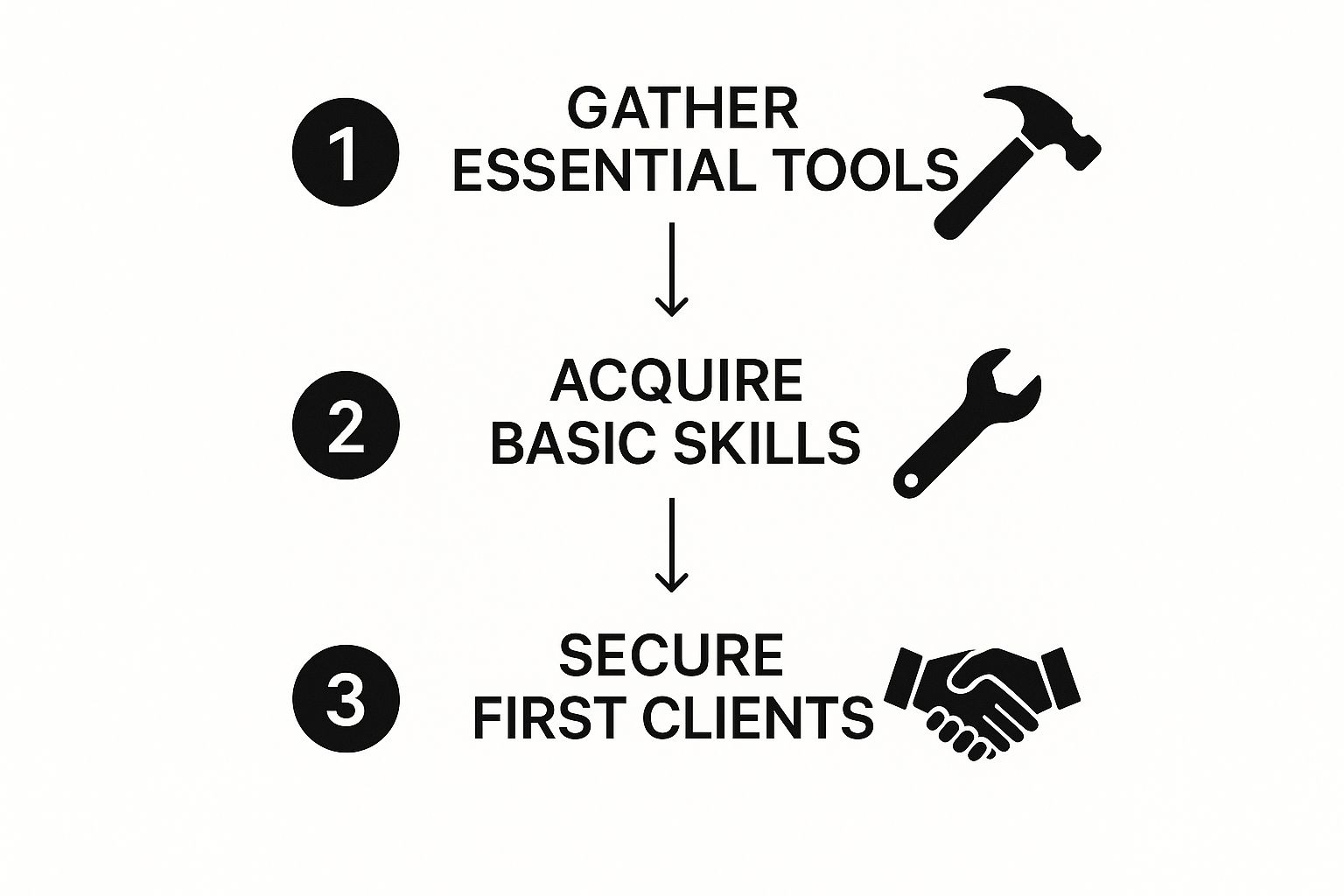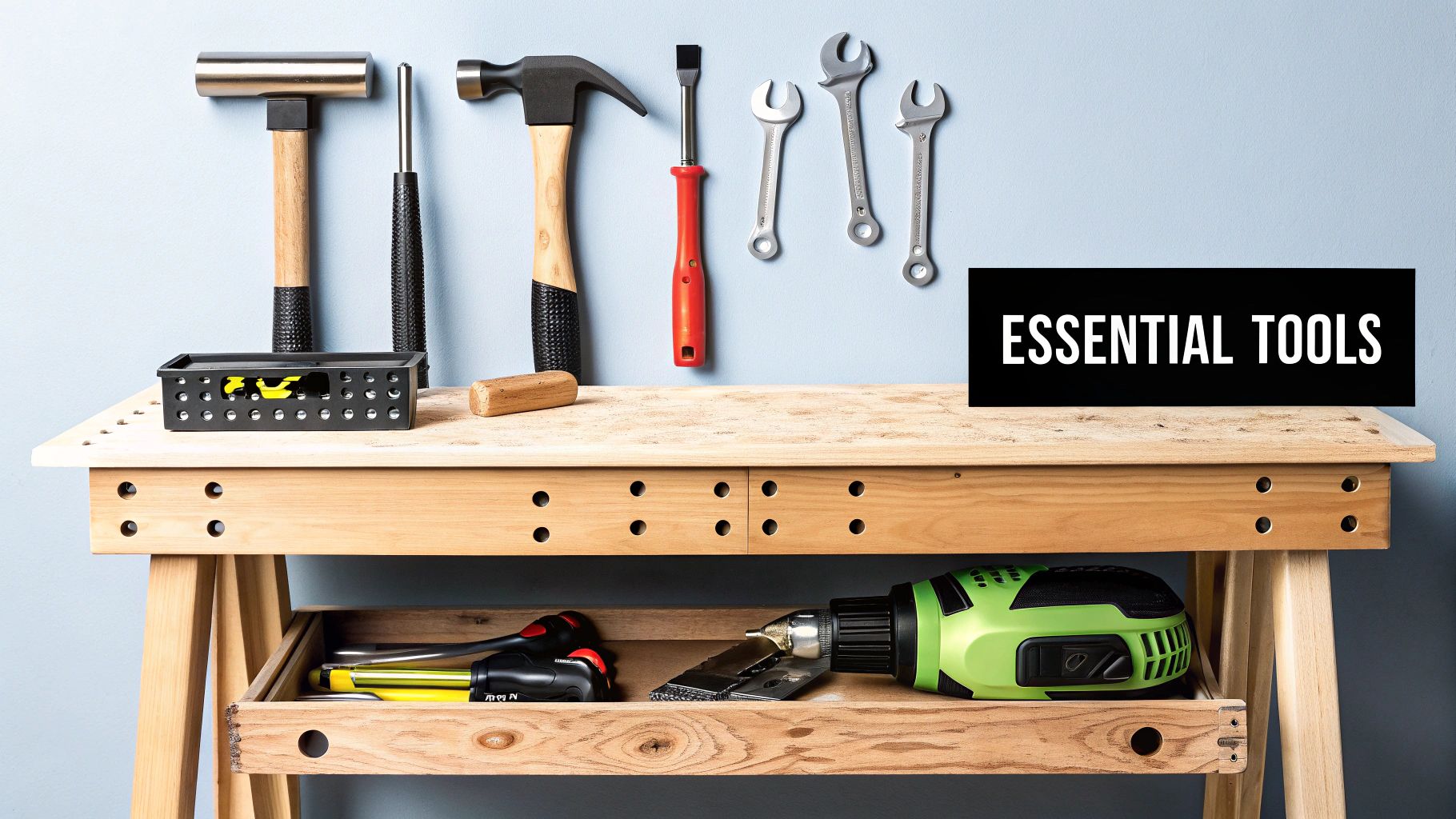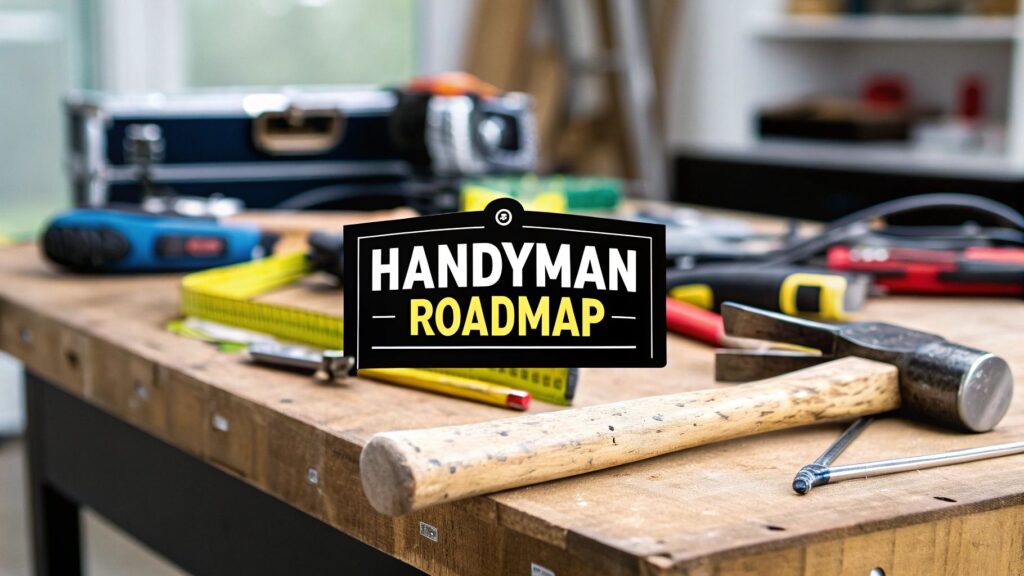Thinking about turning your knack for fixing things into a proper business? It's a fantastic idea, and honestly, it's more within your reach than you might imagine. The journey starts with taking a good, hard look at the skills you already have, figuring out the essential tools you'll need, and getting a handle on the business basics. Let's walk through what it really takes, starting with the groundwork you can lay today.
Your Path to Becoming a Handyman
Starting a career as a handyman is a brilliant move, especially right now. There's a huge demand for people who can reliably fix things around the house. It's a job that genuinely rewards practical talent, smart thinking, and being good with people. But before you rush out to buy a new drill or get business cards printed, the first, most important step is to be honest with yourself about where you're at.
What are you genuinely brilliant at? Maybe you're the family's designated flat-pack furniture wizard, or you can paint a room without getting a single drop on the floor. Pinpointing these natural strengths helps you decide which services you can offer with confidence from day one. You don't have to be a master of all trades straight away. In fact, some of the most successful handymen built their reputation on doing a few key things exceptionally well.
Understanding the Opportunity
This isn't just a local trend; the demand for skilled tradespeople is a massive market. The global handyman service market was valued at around £420 million back in 2022 and is set to grow significantly. The UK is one of the top five countries pushing this growth, which tells you there’s a real, ongoing need for home repair pros right here. If you're curious, you can dive into the full research on handyman market trends to see the numbers for yourself.
This data isn't just a bunch of stats; it's confirmation that becoming a handyman is a solid career choice. Homeowners will always need help with jobs they don't have the time, the know-how, or the tools for. If you can position yourself as the reliable, professional solution to their problems, you're tapping directly into a very healthy market.
This image sums up the journey from enthusiast to pro perfectly.

It breaks the whole process down into three key pillars: getting the right gear, mastering the essential skills, and then getting out there to find clients. Your success really depends on moving through these stages with a bit of thought and planning.
Your Starting Point: A Reality Check
To get started, you need to figure out where you are right now. This isn't about feeling bad about what you can't do; it's about drawing a clear map for what to learn next. A bit of structured self-assessment will highlight your strengths and shine a light on the skills you need to brush up on before you start taking on paid work.
Here’s a simple table to guide you. Use it to honestly evaluate your current readiness and pinpoint areas that need a bit of work before you launch.
Initial Self-Assessment for Aspiring Handymen
| Area of Assessment | Key Questions to Ask Yourself | Next Step if Lacking |
|---|---|---|
| Practical Skills | Which specific jobs (e.g., painting, basic plumbing, tiling) can I complete to a professional standard? Could a paying client find any fault? | Seek out a short course, watch detailed tutorials, or practise on your own home until you're confident. |
| Tool Inventory | Do I own the basic, good-quality tools needed for my core services? Are they in good working order? | Create a priority list. Invest in quality essential tools first, and plan to buy specialised gear as you get jobs that require it. |
| Business Know-How | Do I know how to price a job fairly but profitably? Am I comfortable creating a quote? Do I have a basic plan for marketing? | Read online guides, talk to other tradespeople, or find a small business course. Learn the fundamentals of quoting and marketing. |
| Physical Fitness | Am I physically able to handle the demands of the job, like lifting, climbing ladders, and working in awkward spaces? | Be realistic about the jobs you take on. Focus on tasks that match your physical capabilities. |
Taking the time for this kind of honest review is invaluable. It gives you a solid, realistic foundation to build upon.
The most profitable handyman businesses are built on self-awareness. Knowing what you're great at lets you market those services with real confidence, while knowing your gaps gives you a clear plan for improvement.
Think about it this way: what can you do right now to a standard you'd be happy to pay for yourself? Answering that question with total honesty is the first, most crucial step on your path to becoming a successful handyman.
Developing In-Demand Handyman Skills

Let's be honest, a truly great handyman is far more than just a generalist. They're the versatile, trusted problem-solver people call when things go wrong. Building a solid set of skills that clients are actually looking for is what separates a part-time gig from a proper, thriving business. You don't need to be a master of all trades from the get-go, but you absolutely need a strong foundation.
The trick is to start by mastering the common, high-demand services that will get your phone ringing and establish a reliable income stream.
Mastering the Core Handyman Services
Before you even think about specialising, you need to get really good at the basics. Think of these as the bread-and-butter jobs that will form the bedrock of your business.
- Basic Plumbing: This means confidently fixing leaky taps, swapping out old toilets and sinks, and unblocking stubborn drains. These are constant headaches for homeowners, and being the person who can fix them quickly makes you a local hero.
- Minor Electrical Work: Safely replacing light fittings, dimmer switches, and plug sockets is a frequent request. But remember, and this is crucial: any work involving new circuits or touching the consumer unit (fuse board) legally requires a qualified electrician in the UK. Know your limits.
- Painting and Decorating: A fresh coat of paint can completely change a room, but many people just don't have the time or patience to do it properly. If you can master clean lines and meticulous preparation, you'll never be short of work.
- Carpentry and Assembly: From hanging doors and fitting skirting boards to tackling the dreaded flat-pack furniture, these tasks are a cornerstone of the handyman trade.
Don’t underestimate the power of mastering the 'small jobs'. It might not sound as impressive as a full renovation, but rattling through a client’s long list of minor repairs is often the fastest way to get glowing reviews and word-of-mouth referrals.
So, how do you get these skills? Formal college courses are a great option, giving you structured learning and a qualification to back it up. Another route is to find an apprenticeship or simply get your hands dirty with projects around your own home. The goal is to get so good that you'd happily pay for your own work.
The Power of Finding Your Niche
Once you’ve got a firm grip on the core services, the real opportunity for growth is in finding a niche. Being a generalist is fine, but becoming the go-to expert for something specific is where you can start charging premium rates and attract better clients.
Think about services that demand a particular skill or are seeing a surge in popularity. For instance, you could become the local specialist for assembling garden buildings like sheds, summerhouses, and pergolas. This can be incredibly lucrative, especially during the spring and summer.
Another booming area is smart home installation. As more people invest in video doorbells, smart thermostats, and automated lighting, they need someone who can install and set up these gadgets correctly. This moves you from being just a 'fixer' to a modern, tech-savvy professional.
It's a good idea to map out a personal development plan. Try to add one new skill or perfect an existing one each year. This dedication to learning keeps your services fresh, your skills sharp, and your business in constant demand.
Setting Up Your Handyman Business Correctly

Being brilliant with your hands is one thing, but turning those skills into a real, lasting career means getting the business side of things right. It can feel a bit daunting, but sorting out your legal and financial setup is what separates the serious professionals from the hobbyists. It's the solid foundation you'll build everything else on.
Your first big decision is how to structure your business. Honestly, most handymen in the UK kick things off as a sole trader. It's the simplest route by far, with less paperwork and more straightforward accounting. You and the business are one and the same, so you just need to register for Self Assessment and pay your tax on the profits you make.
The other path is setting up a limited company. This creates a completely separate legal entity, which is great because it protects your personal assets if the business ever gets into debt. While that protection is a big plus, it does mean more complex reporting to Companies House and HMRC. For anyone just starting out, being a sole trader is usually the most practical way to go.
Insurance: Your Non-Negotiable Safety Net
If you only take one piece of advice, let it be this: get insured before you touch a single paid job. The specific cover you need is Public Liability insurance. Think of it as your essential safety net.
Just picture it: you’re hanging a heavy, ornate mirror for a client, your hand slips, and it crashes down onto their prized glass coffee table. Without insurance, the bill for that replacement comes straight out of your pocket. A simple, honest mistake could cost you thousands and sink your business before it's even had a chance to float.
Public Liability insurance isn’t just for your peace of mind—it's a huge signal of professionalism. Sharp clients will often ask to see proof of it before they'll even consider hiring you. It shows them you’re a serious business owner who takes responsibility for their work.
How to Price Your Services
Nailing down what to charge is often where new handymen get stuck. You need to find that sweet spot – competitive enough to win jobs, but profitable enough to actually make a living. The two main ways to go about it are charging by the hour or giving a fixed price for the whole job.
Here’s a quick look at when to use each approach:
- Hourly Rate: This is perfect for those smaller, unpredictable jobs where you're not quite sure what you'll find. In the UK, a realistic range is anywhere from £25 to £50 per hour, depending on your experience and where you're based.
- Fixed Price (Per-Job): This works beautifully for clear, defined tasks. Think assembling a specific IKEA wardrobe or painting a standard-sized bedroom. The client gets peace of mind knowing the final cost upfront, and you know exactly what you'll earn.
When you're crunching the numbers, don't just think about your time. This is a classic rookie mistake. You have to factor in everything: fuel for the van, wear and tear on your tools, your insurance premiums, and any materials you're supplying. Forgetting these hidden costs is the quickest way to find yourself working for pennies.
Investing in Your Tools and Marketing Your Services

With the paperwork sorted and your insurance in place, we get to the exciting part: grabbing the right gear and actually finding your first customers. Having the right tools for the job is just as important as getting your name out there. Smart investments at this stage will pay for themselves by making you more efficient and profitable right from the start.
One of the biggest mistakes new handymen make is spending a fortune on tools they'll barely touch in their first year. You don't need a van packed with top-of-the-line equipment on day one. A much better approach is to build your toolkit gradually, letting the jobs you take on dictate your next purchase.
Building Your Essential Toolkit
First things first, you need a solid set of high-quality essentials. These are the tools that will handle roughly 80% of the typical jobs you'll encounter, from hanging pictures to fixing a leaky tap. This isn't the area to skimp; good tools are safer, get the job done better, and won't need replacing every six months.
Your starter kit should absolutely include:
- A powerful cordless drill/driver: This will quickly become your most-used power tool. Invest in a reliable brand with a versatile set of drill and driver bits.
- A comprehensive socket and screwdriver set: You'll be constantly reaching for these for everything from assembling flat-pack furniture to replacing electrical faceplates.
- Essential hand tools: A quality claw hammer, a few types of pliers (combination and long-nose are must-haves), adjustable spanners, a good spirit level, and a sturdy tape measure are non-negotiable.
- Safety gear: Don't even think about starting a job without proper safety glasses, durable gloves, and dust masks.
As the money starts coming in, you can reinvest some of it into more specialised equipment. Think about a multi-tool for those tricky cuts in awkward spaces, a wet/dry vacuum for professional clean-ups, or even a tile saw if you find yourself taking on more bathroom and kitchen work.
My best advice? Let your clients' needs guide your tool budget. If you get asked to quote for a job that needs a specific tool you don't own, factor the cost of buying or hiring it into your price. That way, your business essentially pays for its own growth.
Low-Cost Marketing That Actually Gets Results
You don't need a massive marketing budget to get the phone ringing. It's all about being clever and focusing your efforts on your local community. The demand for good, reliable handymen is seriously strong and getting stronger. To give you an idea, the global handyman service market was valued at USD 421.4 million in 2023 and is expected to shoot up to around USD 1,197.10 million by 2032. This growth is partly fuelled by online platforms making it easier than ever for homeowners to find local help. You can learn more about the growth of the handyman service market to see just how big the opportunity is.
Effective marketing is simply about being seen where potential customers are already looking. A few simple, low-cost tactics can fill your diary surprisingly quickly.
For instance, professionally designed flyers posted through letterboxes in your target neighbourhoods still work incredibly well. They provide a physical reminder of your services that someone can stick on their fridge for when that inevitable repair job pops up.
Building relationships with local estate agents and letting managers can also be a fantastic source of work. They always need reliable people for quick fixes before a sale or for end-of-tenancy repairs. A friendly visit or a well-worded introductory email can easily lead to a consistent stream of referrals.
Finally, set up a dedicated business number, and make sure it’s connected to WhatsApp. This creates a professional boundary between your work and personal life and makes communication a breeze. Clients appreciate being able to send a quick photo of the problem, and you can respond almost instantly with a quote or a booking slot. It creates an impression of efficiency and trust that wins jobs.
Winning Clients and Building a Trusted Reputation
Let's talk about what really separates the successful handymen from the ones who are always scrambling for work. It isn't just about how well you can hang a door or fix a leaky tap; it's about the entire client experience. Getting this right is how you turn a one-off job into a steady stream of repeat customers who sing your praises to their friends and neighbours.
This is where you stop being just a 'person who fixes things' and become their go-to professional. That trust is built from the very first phone call and continues long after you've packed up your tools for the day.
Nailing the First Impression
Your quote is often the first real taste a client gets of your professionalism, so it has to be spot on. A vague price scribbled on a piece of paper screams amateur and plants seeds of doubt. Instead, give them a clear, itemised quote that breaks down the costs for your time and the materials. This transparency shows you know what you're doing and helps the client see exactly where their money is going.
From that point on, keep the lines of communication wide open. Running ten minutes late? A quick text message makes all the difference. Uncover an unexpected problem behind a wall? Explain it to them clearly, lay out the options, and let them decide without any pressure. It’s these simple courtesies that build massive trust and stop small issues from becoming big problems.
A handyman's reputation is built on a foundation of clean vans, clear quotes, and constant communication. The small details surrounding the job are often just as important as the job itself.
Going the Extra Mile
If you want a surefire way to impress a client, adopt this one habit: always leave their home cleaner than you found it. It’s non-negotiable. Bring your own dust sheets, pop on some shoe covers, and have a decent vacuum cleaner in the van. This simple act of respect for someone's home speaks volumes and is the kind of thing that gets mentioned again and again in five-star reviews.
Keep your eyes open while you're working. You might spot other little things, like a squeaky door hinge or a loose bit of trim. There's a right way and a wrong way to bring this up. Try something casual: "While I'm here, I noticed your kitchen door is a bit squeaky. I've got the right stuff in the van and could sort that for you in about 15 minutes if you like." It comes across as helpful, not pushy, and very often leads to a little extra work on the spot.
Once the job's done and the client is beaming, don't just disappear. A quick follow-up message the next day is a brilliant touch. A simple text or email thanking them for the business and gently asking if they’d mind leaving an online review can do wonders for building your online presence.
This focus on top-tier service is becoming more important as the handyman market gets more organised. The industry is set for some serious growth in Europe, with projections showing an expected CAGR of 16.5% between 2024 and 2033. This boom is partly down to new platforms making it easier for homeowners to find reliable tradespeople. You can learn more about the expanding handyman service market in Europe to get a better sense of what's coming.
Sooner or later, you'll run into a difficult client. It happens. The key is to handle it with grace. Listen to what they have to say without getting defensive, calmly explain your side of things, and work with them to find a fair solution. Turning a complaint into a happy customer is one of the most powerful ways to prove your integrity.
Got Questions? Let's Talk Through the Common Queries for New Handymen
Stepping into any new trade is bound to kick up a few questions. When you're figuring out how to set up shop as a handyman, getting clear on the basics from the start can save you a world of headaches down the line. It's about building confidence and sidestepping those common traps that catch out so many newcomers.
Let's get straight to it and tackle some of the things people always ask.
Do I Really Need Formal Qualifications to Be a Handyman in the UK?
For most of the bread-and-butter handyman jobs, the short answer is no. You don't need a specific qualification to hang a picture, assemble flat-pack furniture, or do a spot of painting. Your reputation will hinge on the quality of your work and your reliability, not a piece of paper.
However, things get serious when you step into regulated areas. Any work that touches gas appliances is a strict no-go unless you're on the Gas Safe Register—that's a legal requirement. Likewise, more involved electrical work, like fitting a new circuit or touching a consumer unit (the fuse board), is the domain of a qualified electrician. While not always legally required, having proper plumbing or carpentry qualifications can seriously lift your credibility and justify a higher price tag.
How Much Should I Be Charging for My Services?
Figuring out your rates is always a bit of a balancing act. What you can charge is shaped by your local area, your experience level, and the kind of jobs you're taking on. Across the UK, a decent, experienced handyman typically charges somewhere in the region of £25 to £50 per hour.
A great starting point is to do a bit of local detective work. See what other handymen in your town are charging to make sure you're in the right ballpark. For bigger projects where you can predict the time involved, like decorating a whole room, offering a fixed day rate is often a smart move that clients appreciate.
Here's a tip that's saved me more than once: when you're quoting, never forget to factor in all your costs, not just your time on the job. Think about fuel, the price of materials, your insurance, and even the wear and tear on your tools. It's a rookie mistake to forget these, and it's the fastest way to realise you're working for peanuts.
What’s the One Piece of Insurance I Absolutely Must Have?
If you get one thing, make it Public Liability insurance. No question, this is the most vital cover for any handyman. Think of it as your financial safety net. It’s there to protect you if you accidentally cause an injury to a person or damage their property while you're working.
It’s easy to imagine: you’re carrying a ladder, you slip, and you end up smashing an expensive vase or, far worse, injuring the homeowner. Without Public Liability cover, a compensation claim could sink your business and even put your personal home and savings on the line. Besides, many savvy clients won't even let you start work without seeing proof of your policy—it's a clear sign you're a professional who takes their responsibilities seriously.
Can I Start a Handyman Business Part-Time?
Absolutely, and it's a brilliant way to begin. Kicking things off as a part-time venture is a low-risk, practical strategy. Plenty of established pros got their start by fitting in jobs on evenings and weekends while still holding down a full-time job.
This approach lets you test the demand in your area, slowly build a roster of happy clients, and bring in extra money without the immediate pressure of it being your only source of income. Just don't forget the official bit: you'll need to register as self-employed with HMRC and make sure you declare all your earnings.
Ready to look like a pro from your very first client call? A dedicated business number is a real game-changer. With Business Numbers Direct, you can get a virtual number for WhatsApp Business that works on your current mobile in minutes—no second SIM needed. It helps you appear professional, manage your jobs efficiently, and most importantly, keep your personal number private. Get your dedicated business number today.




